
Whitespace successfully completes somewhere in the region of 20-25 system implementations every year, working with local authority collection fleets that can have over 200 vehicles. Our Operations Director, Lloyd Booker, discusses how effective planning and attention to detail ensures a smooth transition every time.
The two key elements of any successful implementation are preparation and execution. In order for these to be successful, you must first ensure that the project is correctly resourced. At Whitespace we provide our clients with an allocated project manager ensuring that they have a single point of contact at all times. Involved from the outset, our project managers interact closely with their client’s teams undertaking a number of meetings and workshops. These cover key topics such as data collection and transfer, product familiarisation and training and result in both parties having a detailed understanding of the solution and process.
Prior to implementation ‘kick off’, we agree a ‘Confirmation of Requirements’ document with the customer. This details exactly what they can expect from the implementation and gives the clarity they need to plan and resource appropriately. This document also includes detail on some of the key areas with the potential to impact an implementation:
- Access to data – it is important to understand how a customer’s data is currently managed and how we will access it e.g., paper, Excel or another system. We also provide advice on how to optimise their data on the basis that what you get out of a system is only as good as what you put in
- Access to vehicles – to avoid any issues with the provision of waste services, trucks can’t just be pulled off the road in order to install hardware. This work is often undertaken out of hours in order to minimise impact
- Access to crews – crew training also needs to be planned so that it doesn’t impact on service delivery whilst ensuring that it gives team members time to familiarise themselves and become comfortable with the technology
In addition to detailing delivery and responsibilities, we also run an onsite pilot and complete user acceptance testing ahead of full implementation. During this phase, we install hardware on a test vehicle and run the customer’s specific software solution. This helps identify any potential issues and also provides customers with confidence from advance familiarity with the system.
Once we have taken the customer live with their new system, we enter a four-week period of ‘hyper-care’. During this time, we leave the project manager in place to oversee any ongoing requirements. At the end of this period, we will review and sign off the ‘confirmation of requirements’ document.
At this point, the customer transfers to the care of our contract management team who are available online or on the ‘phone from 07.30 – 17.30 every day. We also have an out of hours technical support team available 24/7 ensuring there is never a time when support is unavailable.
